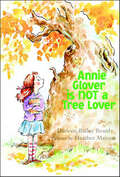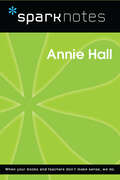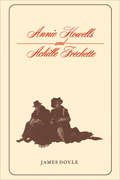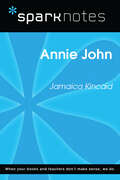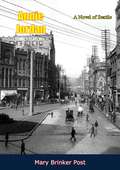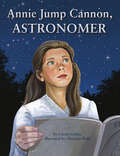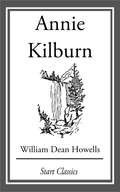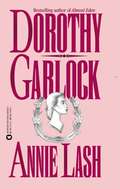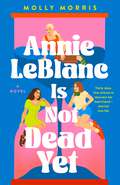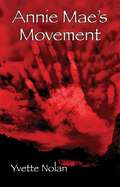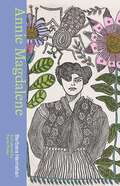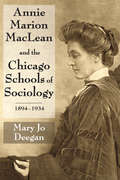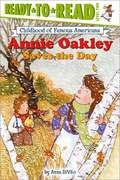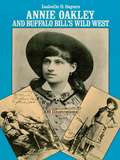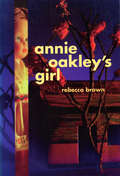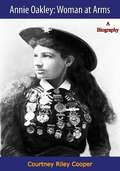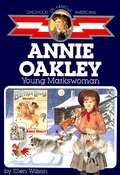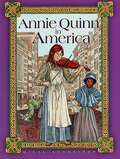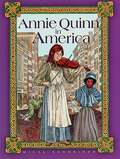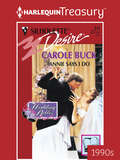- Table View
- List View
Annie Glover is Not a Tree Lover
by Darleen Bailey BeardAnnie Glover's grandma is always protesting something, but she goes too far when she chains herself to a century-old tree and names it Elmer. Elmer is scheduled to be cut down to make way for a new swimming-pool complex and Grandma is trying to save him, but Annie wants that swimming pool—and so do all her classmates. Now she must endure all the other fourth graders asking her embarrassing questions and that pesky Leroy Kirk calling her a "tree lover." However, as Annie considers what Elmer means to her town and to herself, she begins to think that maybe Grandma's not so crazy after all. Adorable illustrations perfectly capture Annie's scheme to save Elmer—with the help of her teacher, her best friend, a zany trio of parachuting Elvis impersonators, and, yes, even Grandma.
Annie Hall (SparkNotes Film Guide)
by SparkNotesAnnie Hall (SparkNotes Film Guide) Making the reading experience fun! SparkNotes Film Guides are one-stop guides to great works of film–masterpieces that are the foundations of filmmaking and film studies. Inside each guide you&’ll find thorough, insightful overviews of films from a variety of genres, styles, and time periods. Each film guide contains: Information about the director and the context in which the film was made Thoughtful analysis of major characters Details about themes, motifs, and symbols Explanations of the most important lines of dialogue In-depth discussions about what makes a film so remarkable SparkNotes Film Guides are an invaluable resource for students or anyone who wants to gain a deeper understanding of the great films they know and love.
Annie Howells and Achille Fréchette
by James DoylePost-Confederation Ottawa sets the scene for this fascinating biography of a literary couple. The marriage of Annie Howells and Achille Fréchette in 1877 brought together two literary families and two cultural traditions. Annie was the daughter of the US consul in Quebec, William Cooper Howells, and sister of the American novelist William Dean Howells. Achille, a translator for the Canadian House of Commons, was the brother of the French-Canadian poet Louis Fréchette. Both Annie and Achille were authors themselves, and their lives and careers touched frequently Ottawa's political, cultural, and religious life. In Ottawa the Fréchettes established themselves at the centre of a distinguished bilingual circle of politicians, poets, and scholars. Their friends included Wilfrid Laurier, Alphonse Lusignan, and, in later years, Archibald Lampman. Both Fréchettes continued to pursue the literary careers they had begun before their marriage. Annie published a serialized novel and many short stories and articles; Achille's poems continued to appear in various periodicals. Achille also took part as writer and trustee in a bitter debate over separate schools. The many surviving letters between Annie and her brother William cover various topics of mutual interest to Canadians and Americans, reflecting both Canadian and American cultural experience in the late nineteenth and early twentieth centuries.
Annie John (SparkNotes Literature Guide Series)
by SparkNotesAnnie John (SparkNotes Literature Guide) by Jamaica Kincaid Making the reading experience fun! Created by Harvard students for students everywhere, SparkNotes is a new breed of study guide: smarter, better, faster. Geared to what today's students need to know, SparkNotes provides: chapter-by-chapter analysis explanations of key themes, motifs, and symbols a review quiz and essay topics Lively and accessible, these guides are perfect for late-night studying and writing papers.
Annie John: A Novel
by Jamaica KincaidThe story is about the sorrow of a young girl Annie, who is getting disconnected with her family as she enters in puberty and how she transforms from an affectionate, obedient child to a defiant one.
Annie Jordan: A Novel of Seattle
by Mary Brinker PostAnnie married Ed Bauer, reliable and stable, knowing that she would always love Hugh.Annie was a fighter. If she couldn’t have Hugh, she could be his neighbour and social equal. So she fought her way up—up in the world of business, up First Hill—until she made Seattle’s first families stand aside for her. Then tragedy struck, and in her grief Annie returned to the waterfront.When Deming’s business began to slide he went to Annie for help. She gave him all of her savings and the same sort of reckless love she had given him years before. Hugh never forgot what he owed to this gallant woman.Mary Brinker Post has created in Annie Jordan, a girl from Skid Road who knew what she wanted, an unforgettable character, and she has done a superb job in depicting all the color, glitter, and lawlessness of early Seattle.
Annie Jump Cannon, Astronomer
by Carole Gerber"Parents and teachers ask me for the names of books for their primary school children. I'm honored to recommend Annie Jump Cannon, Astronomer by Carole Gerber, an excellent book about a true astronomical pioneer." -Paul Kohlmiller, editor, San Jose Astronomical Association newsletter This brilliantly illustrated children's book depicts the achievements of a woman who developed an important system of classifying stars. To this day, Annie Jump Cannon holds the record for identifying more stars than anyone else in the world. In 1925, she became a professor of astronomy at Harvard and the first woman to receive a doctor of science degree from Oxford University. Born during the Civil War, Cannon was determined to pursue a career in astronomy. From her childhood days of studying the constellations with her mother, to her education at Wellesley College and her job in the Harvard Observatory, this biography follows Cannon's inspirational path to success. The story notes the challenges the astronomer faced, such as an illness that left her partially deaf and gender discrimination, while capturing her shining moments as she worked to become the "census-taker of the stars."
Annie Kilburn: A Novel
by William Dean HowellsWilliam Dean Howells (March 1, 1837 - May 11, 1920) was an American realist author and literary critic... In 1858, he began to work at the Ohio State Journal where he wrote poetry, short stories, and also translated pieces from French, Spanish, and German. He avidly studied German and other languages and was greatly interested in Heinrich Heine. In 1860, he visited Boston and met with American writers James Thomas Fields, James Russell Lowell, Oliver Wendell Holmes, Nathaniel Hawthorne, Henry David Thoreau, and Ralph Waldo Emerson. Said to be rewarded for a biography of Abraham Lincoln used during the election of 1860, he gained a consulship in Venice. On Christmas Eve 1862, he married Elinor Mead at the American embassy in Paris. Upon returning to the U.S., he wrote for various magazines, including Atlantic Monthly and Harper's Magazine. From 1866, he became an assistant editor for the Atlantic Monthly and was made editor in 1871, remaining in the position until 1881. In 1869, he first met Mark Twain, which sparked a longtime friendship. Even more important for the development of his literary style--his advocacy of Realism--was his relationship with the journalist Jonathan Baxter Harrison, who in the 1870s wrote a series of articles for the Atlantic Monthly on the lives of ordinary Americans. He wrote his first novel, Their Wedding Journey, in 1872, but his literary reputation took off with the realist novel A Modern Instance, published in 1882, which described the decay of a marriage. His 1885 novel The Rise of Silas Lapham is perhaps his best known, describing the rise and fall of an American entrepreneur in the paint business. His socialviews were also strongly reflected in the novels Annie Kilburn (1888) and A Hazard of New Fortunes (1890). He was particularly outraged by the trials resulting from the Haymarket Riot
Annie Lash (Annie Lash #2)
by Dorothy GarlockWhen her parents died, lovely Annie Lash was left alone in old St. Louis--a prize catch for the elderly suitors lined up at her door. But, yearning for a man who could love her completely--and whom she could love in return, Annie refused them all. Then a young frontiersman named Jefferson Merrick offered her the chance to love in a distant settlement. Dreaming of a future by the wide Missouri, she accepted--never realizing that she would have to face hostile Indians, river bandits, and Jefferson's political enemies. Even more dangerous were the storms of her own heart. For the rugged man who dared to tame the wild country around them was now starting to tame the wild Annie Lash.
Annie LeBlanc Is Not Dead Yet: A Novel
by Molly MorrisEvery ten years in the strange little town of Lennon, California, one person is chosen to return from the dead…Wilson Moss entered the town’s top-secret contest in the hopes of resurrecting her ex-best friend Annie LeBlanc, but that doesn’t mean she thought she’d actually win. Now Annie’s back and Wil’s ecstatic—does it even really matter that Annie ghosted her a year before she died…? But like any contest, there are rules, and the town’s resurrected dead can only return for thirty days. When Wil discovers a loophole that means Annie might be able to stay for good, she’s desperate to keep her alive. The potential key? Their third best friend, Ryan. Forget the fact that Ryan openly hates them both, or that she and Wilson have barely spoken since that awkward time they kissed. Wil can put it aside for one month; she just needs to stop thinking about it first.Because Wil has one summer to permanently put an end to her loneliness—it’s that, or lose her only friends…again. But along the way, she might have to face some difficult truths about Annie’s past and their friendship that, so far, she’s left buried.
Annie Mae's Movement
by Yvette NolanAnnie Mae’s Movement explores what it must have been like to be Anna Mae Pictou Aquash, a woman in a man’s movement, a Canadian in America, an Aboriginal in a white-dominant culture at a time when it felt like we could really change the world. Dying under mysterious circumstances, it is still unclear what really happened to Anna Mae back in the late 70s. Instead of recounting cold facts, this play looks for the truth in examining the life and death of this remarkable Aboriginal woman; that we cannot know the consequences of our actions; that we live on in the work that we do and the people we affect long after we have passed from this world.
Annie Magdalene
by Barbara HanrahanFrom legendary Australian feminist writer Barbara Hanrahan, Annie Magdalene is a quietly moving, funny and perfectly formed novel of a beautifully ordinary life. With a new introduction from Farrin Foster. Born at the turn of the century, Annie Magdalene grows up in a suburban cottage in Adelaide. She is devoted to her family but makes up her mind when she is sixteen that she doesn&’t want a husband or children, instead prioritising friendship, work, independence and a sense of self. In a style that is both simple and full of wonder, legendary Australian feminist artist and author Barbara Hanrahan creates a full portrait of life – its small pleasures, its beautiful flaws, and its inevitable intersections with death. First published in 1985, Annie Magdalene still feels entirely fresh, capturing sleepy war-era Australia as well as many universally enduring truths. With a new introduction from Farrin Foster, this is a moving, funny and perfectly formed novel of a beautifully ordinary life. &‘Quietly and gleefully challenging.&’ – Farrin Foster &‘Hanrahan&’s tour de force.&’ – The Canberra Times &‘A small treasure.&’ – Los Angeles Times
Annie Marion MacLean and the Chicago Schools of Sociology, 1894-1934
by Mary Jo DeeganAlthough Annie Marion MacLean, teacher, sociologist, and leader, gained international fame as an expert on working women's issues, her significant contributions are overlooked by contemporary scholarship. MacLean was extraordinary by any standard�her level of education; her precedent-setting behaviors, research, methodological innovations, public impact, and writing; her dedication to women's freedom and social justice; and her love for family and friends.MacLean was a vigorous and creative exponent of the forceful spirit of Chicago sociologists. As a graduate of the department of sociology at the University of Chicago, MacLean became one of the founders of the discipline. MacLean was an ally and friend to other sociologists in Chicago who were both students and faculty at the university and at another world-class institution, the social settlement Hull-House. She gained fame as an expert on working women, using ideas to expand their options and respond to their need for social justice.Mary Jo Deegan documents the life, accomplishments, and works of this noted scholar. Deegan explores such topics as Annie Marion MacLean and sociology at the University of Chicago and Jane Addams' Hull-House, MacLean and feminist pragmatism, women and the sociology of work and occupations, women's labor unions and the feminist pragmatist welfare state, the sociology of immigration and race relations, and MacLean's legacy to sociology and society. Her inspiring story will be of interest to those exploring the roots of the discipline of sociology.
Annie Moore: Ellis Island's First Immigrant [Approaching Level, Grade 2]
by Lisa KlobucharNIMAC-sourced textbook
Annie Moore: Ellis Island's First Immigrant [Beyond Level, Grade 2]
by Lisa KlobucharNIMAC-sourced textbook
Annie Moore: Ellis Island's First Immigrant [On Level, Grade 2]
by Lisa KlobucharNIMAC-sourced textbook
Annie Oakley Saves the Day
by Anna DiVitoAs young Annie Oakley -- then Annie Mosey -- sees her father off to the mill, she notices the gray sky. It looks like snow, which means a dangerous trip for Father. To take her mind off her worries, Annie shows her brother how to build a trap, just the way their father showed her. Little does she realize just how important this lesson will soon be....
Annie Oakley and Buffalo Bill's Wild West
by Isabelle S. Sayers"You are a very, very clever little girl." -- Queen Victoria to Annie OakleyHer life was the stuff of legend -- from humble Quaker origins in Darke County, Ohio, Annie Oakley (nee Phoebe Ann Moses) rose to the heights of renown as a world-famous entertainer and featured performer with Buffalo Bill's Wild West extravaganza. Her self-discipline, showmanship, and legendary gifts as a sharpshooter earned her the adulation of millions; yet to close friends she was always a generous, gentle woman. She excelled in a man's sport but never lost her feminine appeal. This volume provides a wonderful behind-the-scenes look at the life and career of Annie Oakley -- her impoverished girlhood, long and devoted marriage to Frank Butler, early years with the Sells Brothers Circus, and especially seventeen years spent touring with Buffalo Bill (William F. Cody), playing to packed arenas in America and Europe. More than 100 rare photographs, posters, handbills, and other memorabilia document Annie, Buffalo Bill, Johnnie Baker, and other members of the famous troupe; the show on tour in Europe; Annie's celebrated trick shots, famous visitors, etc. In a career that spanned more than 40 years (1882-1925), Annie Oakley accumulated a remarkable store of memorable experiences: command performances before the crowned heads of Europe; adoption by Sitting Bull (who named her "Little Sure Shot"); and an appearance before the first motion-picture camera, Edison's Kinetograph, in 1894. These and many other outstanding moments come to vivid life in Mrs. Sayer's fascinating and informative text. Through the years, the life and legend of Annie Oakley have been immortalized on stage, film and TV, and in books. Yet few presentations offer as revealing and intimate a look at a genuine American folk heroine as this book. In addition, nostalgia buffs, show-business historians, and Americana enthusiasts will find it an informative account of life with one of the greatest entertainment spectacles of nineteenth-century America: Buffalo Bill's Wild West. Original Dover publication.
Annie Oakley's Girl
by Rebecca BrownPublished in 1993 by City Lights, this collection includes seven stories: "Annie," "The Joy of Marriage," "Folie a Deux," "Love Poem," "The Death of Napoleon: Its Influence on History," "A Good Man," and "Grief. " "One of the freshest, most memorable story collections of my lifetime. And 'A Good Man,' one of the most important. Rarer than the newness, the wit, the vivid readability, is the deep caring understanding, the wholeness, the truth which this astonishing, haunting writer creates her people. 'A Good Man' will be a revelation, an epiphany to many a reader. "--Tillie Olsen "InAnnie Oakley's Girl, people are so much larger, their motives, dreams and mysteries so much more complex than you ever imagined. Love is so much more dangerous, grief so much more powerful, hope so much more tenuous and necessary. I read everything Rebecca Brown writes, watch for her books and hunt down her short stories. She is simply one of the best contemporary lesbian writers around, andAnnie Oakley's Girl is stunning. "--Dorothy Allison Rebecca Brown is the author of a dozen books of prose includingThe Last Time I Saw You,The End of Youth,The Dogs,The Terrible Girls (City Lights) andThe Gifts of the Body (HarperCollins). "Brown's fourth (The Terrible Girls, 1992, etc. ) mixes fantasy, conjecture, and some realism in seven stories that feature atmospheric neo-feminist allegories and fables. The two longest pieces are the most striking: "Annie" (originally published in Adam Mars-Jones'sMae West is Dead: Recent Lesbian & Gay Fiction) is about the narrator's love affair with Annie Oakley--it's part historical pastiche, part touching daydream, and part biting satire. Juxtaposing the narrator's western daydreams with grittier realism, Brown manages to force upon her narrator the kind of rude awakening best displayed by Tim O'Brien inGoing after Cacciato. She also has a good deal of fun along the way: in one instance, Annie Oakley signs autographs at Saks--"the release of her authorized biography coincides with the arrival of the special line of new fall fashions--Annie Oakley Western Wear. " "A Good Man" (which first appeared in Joan Nestle and Naomi Holoch'sWomen on Women II) is a tribute to a decent man dying of AIDS, nursed off and on by his lesbian friend; the striking "Folie a Deux" posits a couple who deliberately cripple themselves--one deaf, one blind--so that "Each of us had something the other didn't have"; and the remaining four stories, published in Britain in 1984, are dreamlike fables. In the best, "Love Poem," the narrator and "you," an artist (the second person becomes a tic in several of these), sneak into the Tate and destroy the artist's work; "The Joy of Marriage" is a touching but ideological look at a honeymoon; "Grief" is about a woman sent off by her clique to a foreign country--she never returns. Occasionally moving, the story's too obliquely personal to make enough sense to a wider audience. Imagistic, edgy fictions about postmodern longing in a world off its screws--and where sadness seems to be a woman's only fate. "--Kirkus Reviews
Annie Oakley: Woman at Arms, A Biography
by Courtney Riley CooperNot long ago, Annie Oakley died, and bequeathed to the famous comedian, Fred Stone, her diaries and personal papers. Adding to personal knowledge, Courtney Ryley Cooper, well-known author and friend of Buffalo Bill, has written a splendid biography.It is a true American epic—the story of a pioneer, who as a little girl was forced to forage with her gun in order that her family might not starve, and who eventually became, with Buffalo Bill, internationally famous as a trick marksman, the idol of youth and the darling of royalty.
Annie Oakley: Young Markswoman
by Ellen WilsonFocuses on the childhood of the famous American sharpshooter.
Annie Pat and Eddie
by Carolyn HaywoodThis is Annie Pat's story, but Eddie is in it too. When Annie Pat (short for Anna Patricia) announces that she is going to be an actress in a summer theater by the sea, Eddie is skeptical. In fact, he shows no interest in her vacation plans at all. But when he is invited to the seashore with Annie Pat and her family he is delighted. Surprisingly enough, the Children's Theater has a special attraction for Eddie, because he likes to print tickets and paint scenery. Annie Pat gives up on acting as a career but becomes interested in painting for a while. Lacking any real paints, she uses jams, in three flavors, and tooth paste, in three colors. But not until the children set up a museum, known as the "you-see-'em," does Annie Pat really come into her own. Both children have a wonderful summer, and thousands of others will have a wonderful time reading this book. In it Miss Haywood, with ease and grace, exhibits once more her extraordinary gift of invention, which seems to flow forth like the sparkling water from a clear spring.
Annie Quinn in America (Adventures In Time Ser.)
by Mical SchneiderAnnie Quinn knows that a new life in America is her only chance. In 1847, the only sure way to survive the potato famine is to leave Ireland. With her younger brother Thomas, twelve-year-old Annie must leave her mother and home behind. She'll join her big sister Bridget, a maid in a New York mansion. At least Annie has her father's fiddle to play. But Annie's fiddle is stolen by smooth-talker Finnbarr O'Halloran as soon as she steps foot in New York. And Bridget likes being a lady's maid, but Annie's stuck polishing gleaming tabletops and washing perfectly clean steps under the housekeeper's eagle eye. She has it better off than Thomas, who sleeps in a cellar and works as a stable boy under the greedy Mr. Belzer. Then Bridget goes to Ohio, Thomas runs away, and Annie is fired! And Annie's adventures are only beginning...
Annie Quinn in America (Adventures In Time Ser.)
by Mical SchneiderAnnie Quinn knows that a new life in America is her only chance. In 1847, the only sure way to survive the potato famine is to leave Ireland. With her younger brother Thomas, twelve-year-old Annie must leave her mother and home behind. She'll join her big sister Bridget, a maid in a New York mansion. At least Annie has her father's fiddle to play. But Annie's fiddle is stolen by smooth-talker Finnbarr O'Halloran as soon as she steps foot in New York. And Bridget likes being a lady's maid, but Annie's stuck polishing gleaming tabletops and washing perfectly clean steps under the housekeeper's eagle eye. She has it better off than Thomas, who sleeps in a cellar and works as a stable boy under the greedy Mr. Belzer. Then Bridget goes to Ohio, Thomas runs away, and Annie is fired! And Annie's adventures are only beginning...
Annie Says I Do
by Carole BuckSingle Guy's Proposal When Matt Powell asked Annie Martin to help him get back into the "singles scene," she figured he needed some advice about women. But Matt's suggestion that they share a few practice dates threw Annie for a loop. Could she really "date" her best friend? Single Gal's Reply The answer was a resounding yes! Matt was sexier-and a better kisser-than Annie could have imagined. Suddenly, marriage-shy Annie was considering saying "I do." But first she'd have to convince her reluctant would-be groom to do the same....
